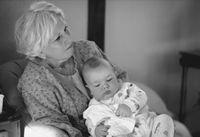Vol. 3, No. 1 • Fall 1998
Kinship Foster Families
Face Major Changes
by Michelle LinbergerMary has mixed feelings. Since taking physical custody of her four-year-old grandson Jonathan, her life has changed dramatically.
Mary's initial decision to care for Jonathan came easy to her. Her daughter, Rochelle, had been involved with drugs and in and out of trouble for years. Finally, DSS removed Jonathan from Rochelle's care due to neglect. Before placing Jonathan with a foster family, DSS asked Mary if she would be willing to take care of Jonathan full time until her could be reunited with Rochelle. She didn't hesitate.
Although we wouldn't go back and change her decision, Mary has found caring for Jonathan an extremely rewarding but stressful task. She never imagined that she would be parenting a child at her age. Three years from retirement, Mary had planned on doing some traveling and becoming involved in community activities. Now these plans are on hold.
Mary is resentful at times because she feels her "golden years" are being taken from her. Later, she feels guilty for having these thoughts. She thinks, "I should just accept this responsibility without complaining. After all, I'm doing it for my grandson, and the situation isn't his fault.
Mary, the grandmother in the fictional case example above, is a kinship foster parent. Like many other grandparents, aunts, uncles, cousins, and siblings. Mary's life has been dramatically altered by her decision to care for the children of family members. The work kinship caregivers do is truly a labor of love.
Benefits
Many children find the transitions associated with foster care to handle when they are placed with relatives. Because he was allowed to live with his grandmother, Jonathan is spared the stress of having to move in with strangers and start new relationships from scratch. Since Jonathan already has a relationship with Mary, his transition into foster care is easier. In fact, remaining with his family is likely to help Jonathan maintain his sense of identity--he'll feel less like a foster child, less a part of "the system."When custody is returned to Rochelle, Jonathan's transition out of foster care will be easier, since his foster mother (Mary) will still be an active part of his life. Most importantly, he is spared the pain and grief many children face when they must say good-bye to a foster family, never to see them again.
Stresses
Families who become kinship foster families also face many challenges. Each family member must struggle to learn a new identity and define a new role for themselves. As this process is taking place, miscommunication, frustration, guilt, and resentment sometimes occur.
Kinship arrangements often spare kids the stress of having to move in with strangers and start new relationships from scratch.Take, for instance, the family in the case example. For Mary, the decision to become involved was made in order to help Rochelle, and to avoid having Jonathan taken from the family. In spite of her good intentions, it's very natural for Mary to feel some resentment, guilt, and disappointment.
Generally, kinship caregivers have reached a point in their lives where they've raised their own children and now finally have a little extra time and money. Any plans to travel, take a class, or volunteer in the community must be put on hold. They are back to raising children again. They may feel overwhelmed as they look at the huge task in front of them, and the time, energy, and resources it will take to be a "parent" to this child.
Birth parents must also cope with changes in their roles. Initially, Rochelle is relieved that her mother can take Jonathan. Rochelle can concentrate on her treatment without worrying about Jonathan's safety in an unfamiliar home.
But eventually Rochelle begins to feel displaced. She feels as if she is no longer the mother. During her weekly visits with Jonathan at DSS, Rochelle notices that he relates to Mary as his mother more and more. Rochelle feels jealous of the attention Mary gets from Jonathan. She can't believe her mother would take her place like this! For her part, Mary can't understand Rochelle's anger or believe how ungrateful she is.
Solutions
In most kinship situations, the scenario is similar: life stages and roles get mixed up. Since their roles have changed, individuals in the family must learn new ways to relate to each other. For the sake of everyone involved, it's important that all family members deal with these stressors. Communication is key. If everyone is able to talk about positive and negative feelings, a lot of resentment can be prevented.It's also crucial that the kinship caregiver have some type of support system. Family members, clergy, and support groups can remind foster caregivers that they are not alone. Many counties have support groups for grandparents raising their grandchildren. By offering a place to share information, solutions, and feelings with peers going through the same experiences, these groups can help tremendously.
Other effective resources, such as parenting classes, mental health services, or respite, can be located by contacting the local DSS or mental health agencies. The AARP Grandparent Information Center (202/434-2296) offers a wealth of information on legal, social, health, and financial issues affecting grandparent caregivers.
Michelle Linberger is a Foster Care Consultant with Methodist Home for Children in Wilmington, North Carolina.
Copyright � 2000 Jordan Institute for Families


